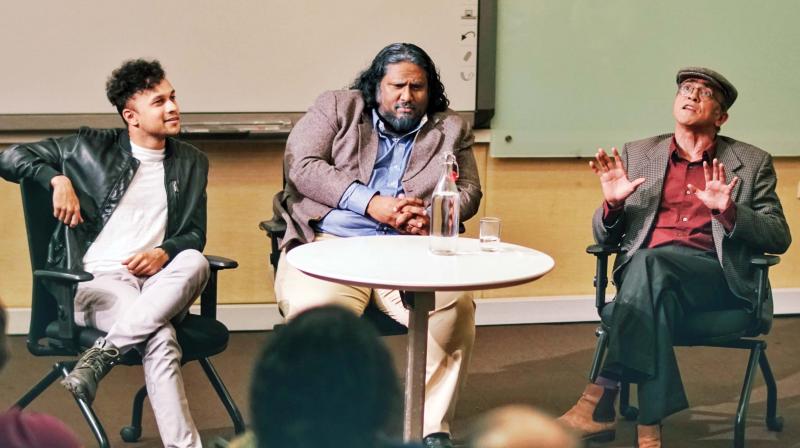The Sound & the Führer

The date is April 20, 1945. The Battle of Berlin rages in Germany and down in the Fuherbunker, Adolf Hitler, ravaged by Parkinsons, fatigue and imminent defeat, lies crouched, awaiting another round of bad news. It comes to him. Hitler is told that Berlin is under attack by the Red Army. As the story unfolds, the German army is forced to beat back a retreat, in a world where betrayals, treachery and treason are a matter of occurrence. And the audience found, as it sat threw Oliver Hirschbiegel's landmark 2004 film, Downfall, a growing sympathy for the Fuhrer himself. The film sparked off a worldwide controversy, with several people of the opinion that humanising Hitler undermines his crimes. Which do we want to remember? The monster or the human being that lay beneath?
A year later, Theresia walser sat down to write her play, in which three actors await their turn to appear on a television show. The first man is established in his profession, the famed Franz Pachtel. The second Ulli Lerch, is on his way to the top and has played the role of Goebbels. The third, Peter Sost, hangs somewhere in between, overshadowed by his more illustrious counterpart. All three men have one thing in common: They have played Adolf Hitler. The waiting period gives rise to a a discussion of undisputed profundity, examining the lives of actors, the choices they make through the roles they play and an artistic need to peel back the layers of every human being, no matter how caricatured. "If you take a role like Hitler,does portraying him as human undermine his atrocities? Usually, when a person has been negatively portrayed in history, it's not something art seeks to break. If art is our lens to history, then we have a responsibility," argues Vandana Prabhu.
The admittedly "difficult to access" German absurdist play came to Vandana almost by chance. She was invited, by the Goethe Institut in Bengaluru, to choose from a list of translated scripts. "I was short on time, honestly but this script leapt out at me." For one, it was about actors too and Vandana found, as she leafed through it, that the characters came to life on the pages. "These actors are discussing what it means, as Germans, to play Hitler. What does it demand of the actor himself? These are the questions thrown up and I realised that our worries as actors living in India really aren't too different."
The play throws up a whole range of questions: Is art limited by history? Or does it owe the latter a certain accountability? "Yes, it's limiting but it depends on how you see it. Interestingly, not a single German actor has ever played Hitler. Cinematic representations of the World War have taken place in the West." The cultural divides are enormous and too many to fully fathom: We use throwaway phrases like "yeh to Hitler hai," Vandana remarks, adding, "In Germany, this isn't on." These contexts are complex and easily overturned, leaving the artist with the unenviable job of tiptoeing between candour and offence.
When A Little Calm Before the Storm made its debut, it did so in the midst of the Padmavathi controversy. Again, the question that arose was the interpretation and the reception of history. "Most people don't read a book or engage in debate." Bollywood and other mainstream media have instead, become gospels of historical and philosophical thought. It was during this, to an attention clamouring for standup comedy shows that provide them with the instant emotional tickle they need at the end of a work-week, or whatever miscellaneous stresses prompt them towards entertainment, that Vandana chose A Little Calm Before the Storm, a complex, textual piece of absurdist theatre.
"It's not easy to access, no, the audience has to work for it," says Vandana, a bold proclamation in the current era of consumption. Much like a debate in the play itself, she toyed between the idea of aspiring to the box office and creating something that would make her audiences think, deciding, of course, on the latter. "We had one audience member write to us three weeks after watching the play, to say they liked it. To me, that's success. On the other hand, I don't want people saying they didn't understand a word - that's indulgence on the other end of the spectrum!"
What: A Little Calm Before the Storm
When: March 30 and 31, 8 pm, April 1, 3 pm and 6.30 pm
Where: Jagriti Theatre, Varthur Main Road, Ramagondanahalli, Whitefield

